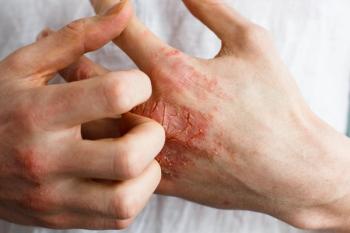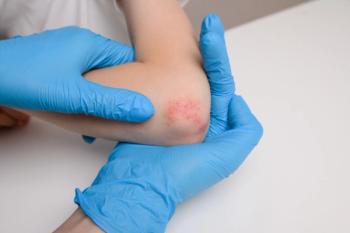
PAD Tech Advancements in Atopic Dermatitis and Psoriasis Treatment
Neal Bhatia, MD, highlights the most exciting new drugs and therapies in atopic dermatitis and psoriasis in his presentation at the current Maui Derm for Dermatologists meeting.
In his presentation, “New Drugs and Therapies in 2022” at the current Maui Derm for Dermatologists meeting in Maui, Hawaii, and virtual, Neal Bhatia, MD, highlighted new atopic dermatitis (AD) and psoriasis treatments coming into the new year.1
Bhatia is the director of clinical dermatology at Therapeutics Clinical Research, in San Diego, California.
Psoriasis and Atopic Dermatitis
According to Bhatia, PAD technology has shown advantages in topical dermatologic therapy, as seen in a novel betamethasone and calcipotriene combination treatment in foam vehicle (Wynzora; MC2 Therapeutics).
PAD technology, according to the MC2 Therapeutics website, enables the mixing of oil and water into a cream using just a fraction of the emulsifier required in conventional creams and lotions.2
In a recent study, researchers found that twice-weekly topically applied calcipotriene/betamethasone dipropionate foam as proactive management of plaque psoriasis was well-tolerated over the 52-week study period and demonstrated superior efficacy to reactive management in a 251-patient study cohort.3
“Wynzora cream is the first launch by MC2 with the PAD technology allowing for stability of the combination of active ingredients for psoriasis and flexibility for use on the body and scalp,” Bhatia said. “The oil and water balance, as well as the elegance of the vehicle, promote significant compliance and efficacy outcomes.”
Patients with moderate to severe AD can benefit from the recently FDA approved ruxolitinib cream 1.5% (Opzelura; Incyte), the first topical janus kinase (JAK) inhibitor of JAK 1 and JAK 2, Bhatia said. This novel medication may offer patients with moderate to severe AD a good treatment option to frequently used treatments including topical corticosteroids and the calcineurin inhibitors tacrolimus and pimecrolimus, he added. In addition, the FDA most recently approved upadacitinib (Rinvoq; AbbVie)4 and abrocitinib (Cibinqo; Pfizer Inc),5 the first 2 oral JAK 1 inhibitor medications for the treatment of moderate to severe AD. According to Bhatia, this offers AD patients more treatment options beyond the more traditional therapies such as corticosteroids, which he said have long-term use issues.
“As opposed to the calcineurin inhibitors which work to block the neurotransmitter NF-AT with subsequent effects on inflammation, ruxolitinib as a [JAK] inhibitor works to stop the progression and processing of cytokines by preventing dimerization of receptors and phosphorylation of STAT proteins that carry messages to the nucleus for transcription,” Bhatia said. “In many ways, the difference is that topical calcineurin inhibitors can mop up the inflammation mess while JAK inhibitors will turn off the faucet to stop the inflammation progress.”
Roflumilast (ARQ-151, Arcutis Biotherapeutics, Inc) and tapinarof (GSK2894512, Dermavant Sciences, Inc) represent 2 novel phosphodiesterase type 4 (PDE4) topical therapies under investigation that have been found to be effective in AD, psoriasis, and seborrheic dermatitis. The once daily topical formulation of roflumilast cream, foam or lotion, is a highly potent and selective inhibitor of PDE4, Bhatia said, having a good efficacy in AD, psoriasis, seborrheic dermatitis, and vitiligo.
Tapinarof is an investigational topical aryl hydrocarbon receptor-modulating agent that has been found to decrease oxidative stress and inflammation in psoriasis and AD, as well as an increase in skin barrier normalization, Bhatia said. Recent phase 3 trials of tapinarof cream for plaque psoriasis found that tapinarof 1% cream applied once daily was superior to vehicle control in reducing plaque psoriasis over 12 weeks.6 Nevertheless, the authors suggested the need for larger and longer studies to appropriately evaluate efficacy and safety of tapinarof compared to psoriasis therapies currently available.
According to Bhatia, it is up to dermatologists to determine how they apply new drugs and their mechanisms of action, as well as the new vehicles where intolerance or sensitivity are potential obstacles.
“The new molecules tapinarof and roflumilast will be exciting topical additions for dermatologists to reduce dependence on steroids as well as treat safely for the long run without risks of atrophy or tolerance. The newly approved oral JAK Inhibitors for [AD] are also going to change the game for us, adding a new strong option along with steroids and biologics,” Bhatia said.
Disclosures:
Bhatia is an advisor and consultant investigator for with AbbVie, Almirall, Arcutis Biotherapeutics, Arena, Biofrontera, Bristol Myers Squibb, Boehringer Ingelheim, Dermavant Sciences, EPI Health, Ferndale, Foamix, Galderma, Incyte, ISDIN, Johnson & Johnson, LaRoche-Posay, LEO Pharma, Eli Lilly and Company, Ortho Dermatologics, Pfizer Inc, P&G, Regeneron Pharmaceuticals, Sanofi Pharmaceuticals, Stemline, Sun Pharma, and Vyne Therapeutics, and an investigator for Arcutis Biotherapeutics, Biofrontera, Bristol Myers Squibb, Boehringer Ingelheim, Dermavant Sciences, Galderma, LEO Pharma, Eli Lilly and Company, and Ortho Dermatologics.
This article was originally published on Dermatology Times .
References:
- Rosen T, Bhatia N. New drugs and therapies in 2022. Presented at: 2022 Maui Derm for Dermatologists; January 24 to 28, 2022; Maui, Hawaii.
- PAD cream technology. PAD Technology. Accessed January 21, 2022. https://padcream.com
- Lebwohl M, Kircik L, Lacour JP, et al. Twice-weekly topical calcipotriene/betamethasone dipropionate foam as proactive management of plaque psoriasis increases time in remission and is well tolerated over 52 weeks (PSO-LONG trial). Am Acad Dermatol.2021 May;84(5):1269-1277. doi: 10.1016/j.jaad.2020.09.037. Epub 2020 Sep 18. Accessed January 20, 2022.
- Rivqoq (unadacitinib) receives U.S. FDA approval for active psoriatic arthritis. AbbVie. Press release. Published December 14, 2021. Accessed January 20, 2022.
https://news.abbvie.com/news/press-releases/rinvoq-upadacitinib-receives-us-fda-approval-for-active-psoriatic-arthritis.htm - U.S. FDA Approves Pfizer’s Cibinqo (abrocitinib) for adults with moderate-to-severe atopic dermatitis. Pfizer. Press release. Published January 14, 2022. Accessed January 20, 2022.
https://www.pfizer.com/news/press-release/press-release-detail/us-fda-approves-pfizers-cibinqor-abrocitinib-adults - Lebwohl MG, Stein Gold L, Strober B, et al. Phase 3 Trials of Tapinarof Cream for Plaque Psoriasis. N Engl J Med. 2021 Dec 9;385(24):2219-2229. doi: 10.1056/NEJMoa2103629. Accessed January 20, 2022.
Newsletter
Pharmacy practice is always changing. Stay ahead of the curve with the Drug Topics newsletter and get the latest drug information, industry trends, and patient care tips.























